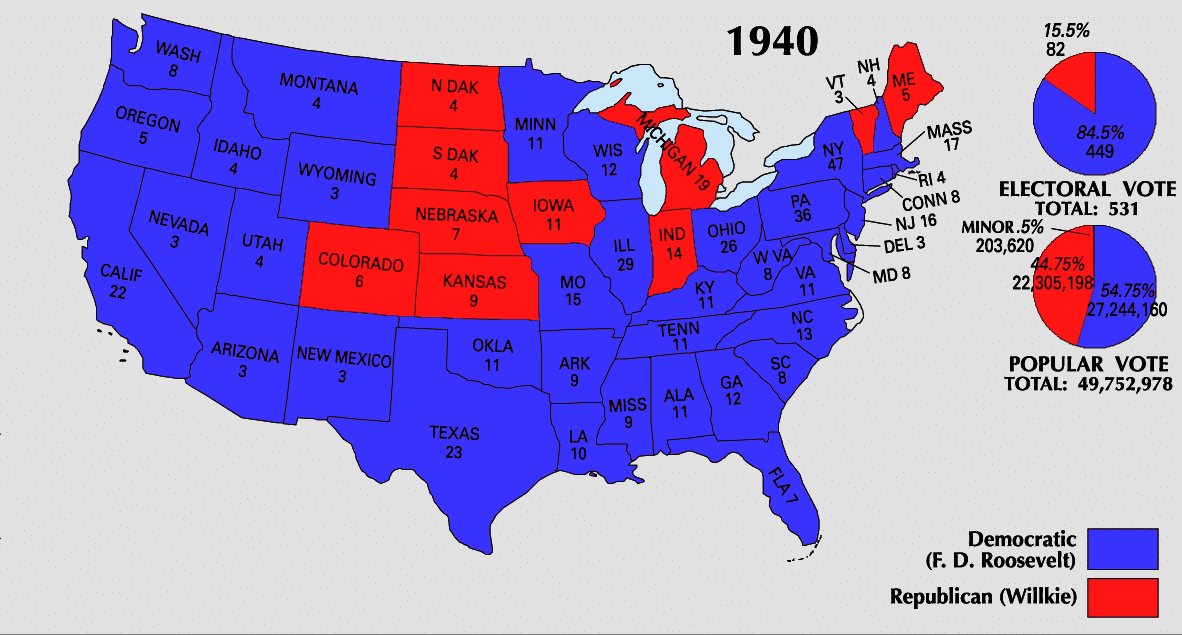The Presidential Election of 1940 occurred on the eve of World War 2.

Albeit slow, the New Deal seemed to be working, and America was beginning to see the light at the end of the tunnel. However, Europe had fallen into war, and Adolf Hitler and Benito Mussolini had begun to conquer Europe and cause much turmoil.
Franklin Roosevelt was reluctant to run for a third term, but he was encouraged by those around him and his allies in Europe. If it had not been for the turmoil, he most likely would have followed the example of others and only ran twice.
However, unlike in the election of 1936, he would not win in a record landslide. The opposition began to build a case against him, and his re-election campaign would be much tougher.
The candidates were as follows:
- Republicans: Wendall Willkie and Vice President Charles L. McNary
- Democrats: Franklin D. Roosevelt and Vice President Henry A. Wallace
Platforms
Foreign Policy would play a major role in the election of 1940 as America had traditionally always been an isolationist when it came to foreign affairs. However, as time passed, the economies of all nations began to affect those of the United States, and the world began to become a global economy.
Wars were also being fought with countries allying themselves with each other across the globe.
Democrats: Woodrow Wilson laid the groundwork for the United States' involvement in foreign affairs during his presidency when he wanted to create the League of Nations to avoid these global conflicts. The league failed, but his ideas stayed with the Democratic party, and the party embraced a more global foreign policy. Roosevelt believed that he would be able to guide the nation through the turmoil in Europe and handle NAZI Germany. He ran on a foreign policy that would advocate the spread or defense of democracy.
Republicans: In contrast to Roosevelt's global foreign policy, the Republicans wanted to continue to be isolationists and not participate in the war. They did not want to support any country in World War 2 and advocated that they continue with the foreign policy of the past. However, the world was changing, and these ideas were believed to be out of date. Republicans under Theodore Roosevelt had embraced a more global foreign policy, but after World War I, they had returned to their isolationist beliefs. This led to a divide in the Republican Party.
Outcome
This campaign was much tougher as the Republicans argued against Roosevelt's run for a third term since he was breaking a precedent that was set by George Washington. Wendall Willkie argued that "if one man is indispensable, then none of us is free." Even some Democrats who had supported Roosevelt in the past disapproved of his attempt to win a third term, and Willkie hoped to win their votes.
Willkie also criticized what he claimed was the incompetence and waste in Roosevelt's New Deal welfare programs. He stated that as president, he would keep most of Roosevelt's government programs, but would make them more efficient.
Franklin Roosevelt won in another landslide, but the Republicans did gain some ground. Roosevelt had established himself as a trusted voice and did not want to venture into the unknown with someone they did not know.
However, there started to be a pushback to the power FDR was beginning to wield as President.
